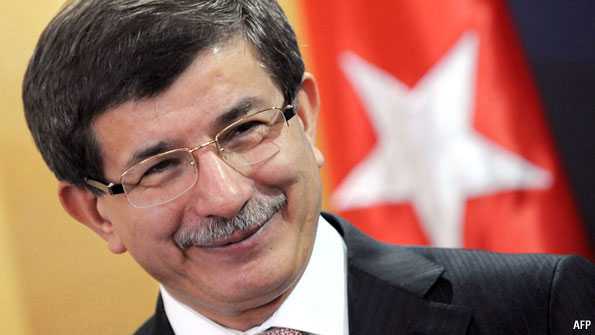There is little love lost between the top UN envoy to Afghanistan, Kai Eide, and Peter Galbraith, his recently dismissed deputy.
Galbraith was dismissed from the UN mission earlier this month after accusing the senior Norwegian diplomat of concealing information about the extent of fraud in the contested Afghan presidential election.
Eide later responded with an angry defense of his reputation as an honest broker. He acknowledged there had been “significant” fraud but said that Galbraith, a former U.S. ambassador, had no way to substantiate claims that as much as 30 percent of the vote count was influenced by fraud.
Now, in an ironic twist to the story, Galbraith, too, has suddenly found himself at the center of alleged scandal that could damage his own reputation.
That scandal is taking place in Norway, where Galbraith, the son of famed Harvard economist John Kenneth Galbraith, lives in Bergen with his Norwegian wife.
Norway’s largest financial newspaper, the “Dagens Naeringsliv,” reported last week that Galbraith acquired a 5 percent share in an oil field in the Iraqi Kurdish region at a time when he was a leading voice in the U.S. debate over the structure of post-Saddam Iraq.
At the time, the former diplomat urged in meetings with U.S. officials and in articles in the “New York Review of Books” that the Kurds should be given maximum autonomy.
And he helped draft Iraq’s 2005 constitution by advising Kurdish leaders on legal language they should seek to insert into it — including keeping future oil development in their region under their own control.
The U.S. daily “The Boston Globe,” which picked up the story on October 15, reports that in the lead-up to the Iraq war, Galbraith worked as an adviser to then-U.S. Deputy Defense Secretary Paul Wolfowitz.
Galbraith then left government service and in late 2003 and early 2004 worked as a paid consultant to Kurdish politicians. Later, in 2005, he advised them again on an unpaid basis.
Conflict Of Interest?
Galbraith’s dual role in Iraq appears to have broken no laws. But it does raise ethical questions, according to some analysts.
“The dual role is problematic particularly in terms of the American policy debate that unfolded from around 2005 to 2007, in which Galbraith was the leading voice in shaping the so-called alternative to the Bush administration policy,” says Reider Visser, a research fellow at the Norwegian Institute of International Affairs in Oslo and the editor of the Iraq-focused website historiae.org.
“At the core of that alternative was the idea of some sort of radical decentralization for Iraq,” Visser says. “But when it now emerges that additionally he had an ownership interest, or a business interest, in an oil field whose political and economic status was directly governed by his policy recommendations, then I think we can speak of a conflict of interest.”
Galbraith says in “The Boston Globe” that he sees no conflict of interest because he was working as a private citizen at the time.
“The business interest, including my investment into Kurdistan, was consistent with my political views,” he told the paper. “These were all things that I was promoting, and in fact, have brought considerable benefit to the people of Kurdistan, the Kurdistan oil industry, and also to shareholders.”
Rumors of Galbraith having financial dealings in Iraq have swirled around for years. But the Norwegian newspaper’s detailed account stems not from an investigation into Galbraith but into a Norwegian oil company, DNO.
The investigation, as often happens in such cases, advanced in unanticipated ways, with one discovery leading surprisingly to another.
The newspaper began by looking into a large, unexplained fine leveled on DNO by the Oslo Stock Exchange on June 18. DNO is the only Norwegian oil company active in northern Iraq and one of the first foreign companies to receive a drilling license from the Kurdistan regional government (KRG).
The minutes of the stock exchange meeting showed only that the fine was to punish DNO for selling 5 percent of its shares to a publicly undisclosed buyer. “Dagens Naeringsliv” filed a Freedom of Information request with the stock exchange and learned that the undisclosed buyer of the shares was the KRG itself.
When “Dagens Naeringsliv” published that news, the KRG reacted vehemently to being publicly named. It threatened to suspend DNO’s activities in Kurdistan and evict the company without compensation. It also set some conditions for continued cooperation with DNO, including one that was completely unexpected: for the company to clear up all conflicts with “third-party interests.”
Again the newspaper’s interest was piqued. This time, the challenge was to find out the identity of the “third party,” which apparently had previously been part of an agreement with DNO and the KGR but which now was in a conflict so important it needed to be solved immediately.
Unexpected Connections
In the search, the paper learned of an arbitration case in London which started sometime after March of last year and pits DNO against two companies: one called Porcupine, the other belonging to a Yemeni businessman. Tracking down Porcupine led to Delaware, where it turned out the company’s incorporation document was signed by Peter Galbraith.
The financial news editor of “Dagens Naeringsliv,” Terje Erikstad, says the discovery of Galbraith’s name was completely unanticipated.
“We started out the investigation looking at the fine levied against a mid-sized Norwegian oil company, DNO,” Erikstad says. “It is often in the news because it was a pioneer in northern Iraq and its shares on the Oslo stock exchange go up and down with developments there. We were not looking for Galbraith’s name at all, so finding it on [Porcupine’s] founding documents in Delaware was quite a surprise for us.”
Porcupine was established in Delaware on June 30, 2004 — one day after DNO signed a contract with KRG to begin drilling for oil in northern Iraq.
Later, the relations between the partners — KRG, DNO, and the third party –soured for as yet unknown reasons. The contract between DNO and the KRG was renegotiated last year and the third party was dropped out of the agreement. That, in turn, appears to have sparked the arbitration case in which the third party — Porcupine and the Yemeni businessman — is asking compensation.
The Norwegian newspaper reports that the compensation sought is equivalent to 10 percent of the total reserves and output of the Tawke field, where the DNO operates. The paper published a document from 2006 that lists the partners in the Tawke field and shows Porcupine as having a 5 percent interest in it.
The paper estimates that the total amount of compensation being sought jointly by Porcupine and the Yemeni businessman is some $525 million. A ruling is expected in the first half of next year.
DNO has the capacity currently to export roughly 43,000 barrels per day from Iraqi Kurdistan, worth approximately $30 million annually. However, exports are currently blocked as the KRG and Baghdad continue to dispute the same kind of issues Galbraith once tried to resolve.
The current dispute is whether Baghdad, which handles the sale of all exported oil, should pay any of DNO’s operating costs when DNO is working under a contract awarded by the KRG but not recognized by the Baghdad government.
Baghdad insists instead that the KRG pay the company out of the 17 percent of Iraqi oil revenues that the Kurdish region receives under Iraq’s current revenue-sharing agreement.
A final Iraqi oil law to resolve such conflicts between Baghdad and the KRG has been under discussion ever since the signing of Iraq’s 2005 constitution, with no conclusion in sight.
https://www.rferl.org/a/Iraq_Oil_Scandal_Threatens_Former_US_Diplomat_Galbraith/1852916.html





 Peter Galbraith says his business activities took place only when he was working in the private sector.
Peter Galbraith says his business activities took place only when he was working in the private sector.
